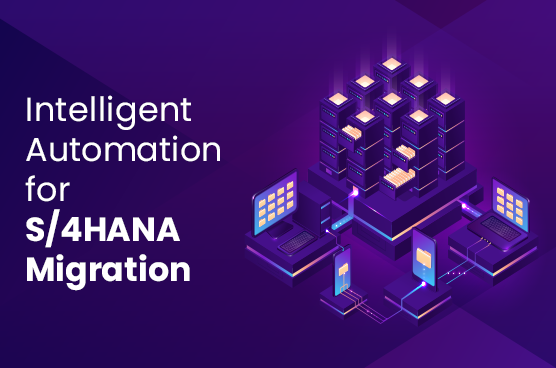_ _ Infobelt
Accelerating S/4HANA Migration and Archiving with AI
One of the most significant transitions for many organizations is migrating to SAP S/4HANA, a next-generation ERP system designed for the digital age. However, this transformation brings challenges, particularly in managing legacy data and ensuring seamless transitions. Artificial Intelligence (AI) has emerged as a game-changer in this context, offering innovative solutions to streamline migrations, optimize archiving, and unlock new opportunities during digital transformations.
The Challenges of S/4HANA Migration and Legacy Data
Migrating to SAP S/4HANA involves more than just upgrading software—it requires rethinking how data is managed. Organizations often face:
- Massive Data Volumes: Years of accumulated data must be assessed, cleaned, and migrated without disrupting operations.
- Legacy System Complexity: Outdated systems hold critical historical data but are costly and inefficient to maintain.
- Compliance Pressures: Regulatory requirements demand secure handling of sensitive information while ensuring accessibility for audits.
- Operational Continuity: Businesses must ensure that critical processes remain uninterrupted during the transition.
These challenges highlight the need for intelligent tools that can manage data efficiently while supporting innovation.
How AI Enhances S/4HANA Migrations
AI plays a pivotal role in overcoming migration challenges by introducing automation, intelligence, and efficiency into the process. Here’s how AI contributes:
1. Data Assessment and Optimization
AI-powered tools can analyze vast amounts of legacy data to identify what is essential for migration and what can be archived or discarded. By automating this process:
- Redundant or obsolete data is removed, reducing storage costs.
- Only high-value data is migrated, ensuring a leaner and more efficient system.
2. Intelligent Data Mapping
Migrating data from legacy systems to S/4HANA often requires extensive mapping between old and new data structures. AI algorithms can:
- Automate the mapping process using pattern recognition.
- Ensure consistency and accuracy by minimizing human errors.
- Adapt dynamically to complex scenarios, such as mergers or acquisitions.
3. Enhanced Data Quality
AI improves data quality through automated cleansing processes:
- Identifying inconsistencies or duplicates.
- Standardizing formats across datasets.
- Ensuring compliance with regulatory standards like GDPR by anonymizing sensitive information where necessary.
4. Predictive Analytics for Migration Planning
AI-driven predictive models help organizations anticipate potential risks or bottlenecks during migration. By analyzing historical data and system performance:
- Organizations can proactively address issues before they escalate.
- Migration timelines can be optimized for minimal disruption.
AI’s Role in Archiving Legacy Data
Archiving is a critical component of any S/4HANA migration strategy. Historical data often holds immense value for compliance, audits, or future analytics but doesn’t need to reside in primary systems. AI enhances archiving processes by:
1. Automated Archiving Decisions
AI algorithms can classify data based on its relevance and regulatory requirements:
- Frequently accessed or compliance-critical data is archived in accessible formats.
- Less critical data is stored securely at lower costs.
2. Data Retrieval Optimization
Archived data must remain accessible for reporting or auditing. AI-powered search capabilities enable:
- Quick retrieval of specific records through natural language queries.
- Context-aware searches that understand relationships between datasets.
3. Compliance Assurance
AI ensures that archived data adheres to evolving compliance standards by:
- Monitoring regulatory changes and updating archiving practices accordingly.
- Implementing robust anonymization techniques to protect sensitive information.
Unlocking New Opportunities During Digital Transformation
Beyond migration and archiving, AI opens doors to innovation during digital transformations. By leveraging historical and operational data effectively, organizations can:
1. Drive Business Insights
AI transforms legacy data into actionable insights through advanced analytics:
- Identifying trends or patterns in historical performance.
- Supporting strategic decision-making with predictive models.
2. Enable AI-Powered Applications
The integration of AI into S/4HANA systems allows businesses to develop intelligent applications:
- Automating routine tasks like invoice processing or inventory management.
- Enhancing customer experiences with personalized recommendations.
3. Support Scalable Growth
As businesses grow, their systems must adapt to increasing complexity. AI ensures scalability by:
- Continuously optimizing system performance through real-time monitoring.
- Simplifying the management of hybrid environments that combine legacy archives with modern systems.
Strategic Benefits of AI in Transformation Projects
By incorporating AI into their S/4HANA migrations and archiving strategies, organizations can achieve several long-term benefits:
- Cost Efficiency: Reduced storage needs and streamlined operations lower overall costs.
- Improved Compliance: Automated processes ensure adherence to regulations with minimal manual intervention.
- Faster Time-to-Market: Accelerated migrations allow businesses to adopt new technologies more quickly.
- Future-Proofing: AI-ready systems position organizations to leverage emerging technologies like machine learning and advanced analytics.
Conclusion
The journey toward digital transformation is complex but rewarding. As organizations migrate to SAP S/4HANA, they must navigate challenges related to legacy systems, data management, and compliance. AI offers a transformative solution by automating processes, enhancing efficiency, and unlocking the value hidden within historical data.
By integrating AI into their strategies, businesses not only overcome immediate hurdles but also build a foundation for sustained innovation. Whether it’s streamlining migrations, optimizing archiving practices, or driving future growth through intelligent insights, AI empowers organizations to turn challenges into opportunities in their digital transformation journey.

